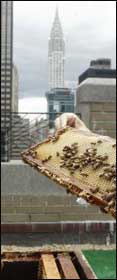Rooftop Bee Keeping
Living in the city is great if you enjoy a hustle and bustle. But at
some point you will have the urge to get back to nature, to just sit on some grass and just appreciate
nature. But taking the time off to find yourself a spot of peace and
quiet isn't always possible.
urge to get back to nature, to just sit on some grass and just appreciate
nature. But taking the time off to find yourself a spot of peace and
quiet isn't always possible.
It seems there is a little bit of an oasis on your door step, especially if you live in a flat. You will be doing your bit for nature by providing a home for a swarm of bees and you will be able to reap the benefits of fresh honey.
There are a number of buildings in New York which have extended their contributions to the greening of New York's buildings to their rooftops. Planting ground cover and because of the few bees this attracted, added some hives, high up on the 17th floor of a building and in another case on top of an art gallery.
Following suit will allow you to create yourself a quiet green space and give you a relaxing hobby, while you are up on the roof of your building. Just be sure to get the consent and maybe even the participation of the other tenants in your building. Honey and bees are a benefit to all.
Modern take on Beekeeping
Although unveiled at Dutch Design Week in 2011 these hives did not
make it into production, but they would surely be a must have item for
those who are both style and ecologically conscious.
Reminiscent of something from a 1950's sci-fi movie this egg shaped hive appears to be attachable to inside or outside walls as it is sealed and has only one entrance so security for the bees will be a breeze. The hive is fitted with textured frames which will make it easier and encourage bees to build honeycomb.
Should you feel like harvesting honey in your futuristic loking kitchen there is even a vent for blowing smoke into the hive to calm the bees.
Clearly the designer of this hive is hoping bees and honey will be
around for ages yet!
Bee keeping in the city
Backyard bees were very popular a good number of years ago especially when the economy forced families to grow their own food. There were some that were resourceful enough to make use not only of the honey but also of the wax to make candles and sealants on jars of preserved fruit.
The practice of preserving food and providing as much as you can from your own back yard had lost popularity, particularly as modern living required more time away from home.
The popularity of keeping bees is on the increase again, but this time around it's largely due the disappearance of large numbers of bees, referred to as colony collapse disorder.
Many have taken their responsibilty to nature seriously and as result are building hives and enticing colonies of bees to stay. A noble gesture to say the least, the bees are safe and if the garden is large they are well fed but how does this impact on crops that rely on pollination if at all?
There are bylaws which govern the keeping of bees in urban areas, these bylaws are different around the globe ranging from allowing bees to be kept, where they are kept and the number of colonies per property. Countries which previously banned beekeeping in urban areas have eased up on their restrictions as a result of colony collapse disorder in the hope that the bee population will once again grow.
Before you decide to keep bees there are a few considerations.
- Are you or anyone in your household allergic to bees?(Don't let this deter you, just be sure to take the proper precautions and have an Epipen on hand)
- Do you have pets and are you able to seperate them from the bees
- What are the by-laws in your area regarding bees
Visit http://brasa.co.za/ and see what the bylaws are regarding the keeping of bees in South Africa
